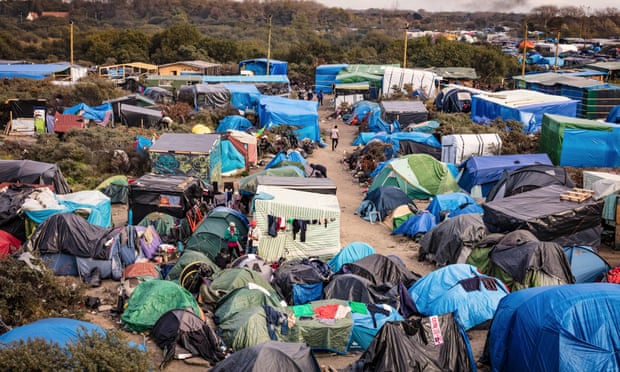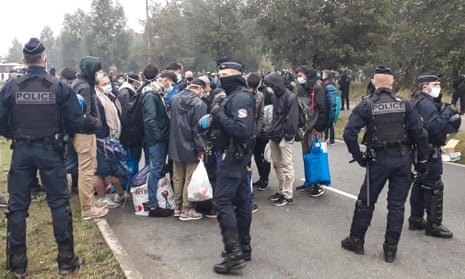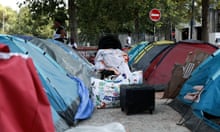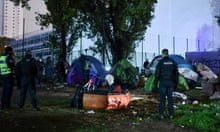French police have dismantled a migrant camp in the northern port of Calais from where thousands of people have sought to cross the Channel to reach British shores.
The operation to clear the makeshift camp, which was home to about 700 people, began shortly before sunrise on Tuesday. It was the biggest such operation since the sprawling camp known as the “Jungle” was broken up four years ago.
Several thousand people have attempted the perilous crossing this year, often paying people-smugglers to help them traverse one of the world’s busiest shipping lanes in overloaded rubber dinghies.
Q&AThe Calais camp explained
Show

Why did
Calais
become a
staging post?
Refugees have been gathering in Calais on their way to the UK for decades. Periodically the French authorities attempt to prevent them from coming but asylum seekers continue to arrive. Some pay people-smugglers to get them into lorries parked near the port while those who have no money try to conceal themselves in moving trucks.
Who travels to camps on the Channel?
Many asylum seekers have relatives or friends in the
UK or have some level of English language skills. But
the 1,000 or so refugees currently living in Calais and
Dunkirk represent a very small proportion of refugees
seeking asylum across Europe.
Although the situation in Northern France attracts attention because it is at the UK border, the numbers gathered here are tiny compared with the 100,000- plus who arrived in Europe in 2017, the vast majority of whom intend to claim asylum elsewhere in Europe.
What are politicians doing to change the situation?
The British government contributed to a £17m joint Anglo-French package of security measures, including the construction of a 1km-long concrete wall, aimed at preventing asylum seekers from getting close lorries arriving at the port.
But charities say extra security does not prevent the arrival of new refugees. They want the British government to make it easier for vulnerable unaccompanied children to travel legally and for France to accept that there will always be some refugees in Calais, and provide dignified reception centres.
Britain has repeatedly pressed Emmanuel Macron’s government to do more to prevent people leaving France. The British government has called the high numbers who made the illegal crossing this summer unacceptable. France says it has stepped up patrols.
Many of those trying to make it to the UK are from Afghanistan, Iraq, Iran, Syria and countries in Africa, fleeing poverty, persecution or war.
“We want to avoid a concentration and a new gathering point in Calais,” Louis Le Franc, the government’s top official for the northern Pas-de-Calais department, said at the scene.
About 150 of the evacuated migrants will be brought to reception centres in Pas-de-Calais, a further 150 to other departments in northern France, and the remaining 500 or so to other regions of the country.
“In my view, this is above all an operation to give people a safe haven. The migrants are living in this forested area in extremely difficult conditions,” Le Franc said. “It was important to get the migrants out before … the winter period.”
A man who was in the Calais camp told the Guardian police officers arrived at about 7am, rounded people up and put them on buses.
“No violence was used by the police,” he said. “We were told we had to leave our tents and sleeping bags behind and could just take our bags with us. Now there are 16 asylum seekers on the bus with a driver and four police officers.”
The man said they were still on the bus after three hours but “we have not been told where they are taking us”.
He was one of a group of 11 Syrian people who were forcibly removed from the UK by the Home Office and sent to Spain this month, because all had previously been fingerprinted there.
“The 11 of us who were abandoned in the street in Spain have pledged to stay together,” he said. “We are all on the bus together. All of us want to reach the UK. Wherever they take us now we will still try to find a way to reach the UK. Even if they take us as far as the moon we will still try to reach the UK. I have two brothers there and I want to be with them.”
He said he and his 10 friends were upset about the way they had been moved around Europe and dumped in and then removed from one European city after another.
“It is like the authorities think we are animals and they are taking us from one farm to another,” he said. “There are people in the Jungle from African countries, from Syria, from Yemen, from Iran and from Kurdistan. I don’t know where they will all end up.”
Reuters and Agence France-Presse contributed to this report









